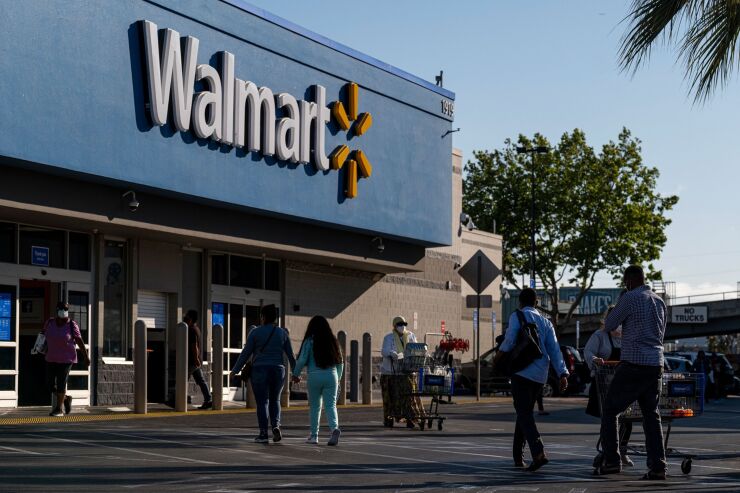Walmart is adding to its ever-growing arsenal of financial services by providing a way for customers to use cash for digital payments to utility companies and other billers.
The service is being offered through PayNearMe, a company that enables cash-reliant consumers to make bill payments at convenience stores and other locations.
"Cash is still a very important payment type," said Laura Rummel, senior director of account management and retail partnerships at PayNearMe, a cash-to-digital payment firm that on Tuesday added Walmart to its merchant network. A PayNearMe partnership with Green Dot is also driving the partnership. "They're not paying with cash because they want to, they're paying because they have to."
Walmart uses its scale and localized dominance — in many of its markets it's both the largest employer and largest retailer — to compete with both banks and other merchants by offering products from both industries in multiple channels.
To enhance its payments business, Walmart earlier this year added

Shoppers present a scannable code on their smartphones to a Walmart MoneyCenter employee, pay their bills with cash and collect a receipt that confirms the payment. The funds are then transferred to the biller electronically.
"A lot of our merchants ask us, 'when are you going to expand to add Walmart?'" Rummel said."By far it's the most requested retailer that we get."
The Walmart pact adds a retail chain with more foot traffic than its typical partnerships, Rummel said, as well as product scale. PayNearMe works with 7-Eleven and Family Dollar, among others.
While most of PayNearMe's clients are strictly focused on retail, financial services are an important part of Walmart's expansion. Walmart did not return a request for comment by deadline.
Walmart's foray into financial services includes working with fintech investor
PayNearMe is not part of the Ribbit Capital project, but PayNearMe does get a higher profile and extra potential users, as well as an added outlet for existing PayNearMe users who shop for groceries at Walmart. "With their Money Center and white label partners, Walmart is positioning itself as a destination for financial services," Rummel said.
The Santa Clara, Calif.-based PayNearMe's roots are in enabling consumers to pay rent and utility bills in cash at convenience stores such as through a printed mobile barcode that consumers use to complete payments..
PayNearMe has added tax payments, a self-service option and health care payments to accommodate an increase in consumer-direct transactions following the passage of the Affordable Care Act. More recently, PayNearMe expanded to support cash payments to betting sites for
PayNearMe can also benefit from its Walmart partnership as a competitive differentiator against rival cash payment companies.
This week Isle of Man, U.K.-based Paysafe expanded its partnership with IntelliPay, a Draper, Utah-based payment technology provider. The two firms will allow consumers without bank accounts the ability to pay for bills online through multiple payment methods. The collaboration covers many of the same use cases as PayNearMe, including property management, government services, utilities, non-profit, health care and education.
Paysafe and IntelliPay referenced data from the
Fiserv's CheckFree service also supports cash payments at supermarkets for recurring bills. Fiserv is additionally using CheckFree to support
Another provider, Blytzpay, sends bills via text message with a link for consumers to make a payment. For cash-dependent consumers, Blytzpay sends a QR code for payment at a convenience store network.
Consumers have long been visiting their grocery stores and other types of big box or convenience stores to pay their bills, says Talie Baker, a senior analyst at Aite, adding the use of mobile and QR codes to execute cash bill pay at big box stores is a result of a pandemic-inspired move to contactless commerce and the near ubiquitous use of mobile phones.
"It takes friction out of the cash bill pay process for the biller, the payer and the intermediary," Baker said.
"The story here is about 'digitizing' cash bill pay and reaching consumers where they're at, on their phones," Baker said. "Consumers are more familiar with using QR codes thanks to the pandemic, and this capability combined with mobile is allowing billers to more easily accept cash payments from the sector of society that is still dealing in cash."





